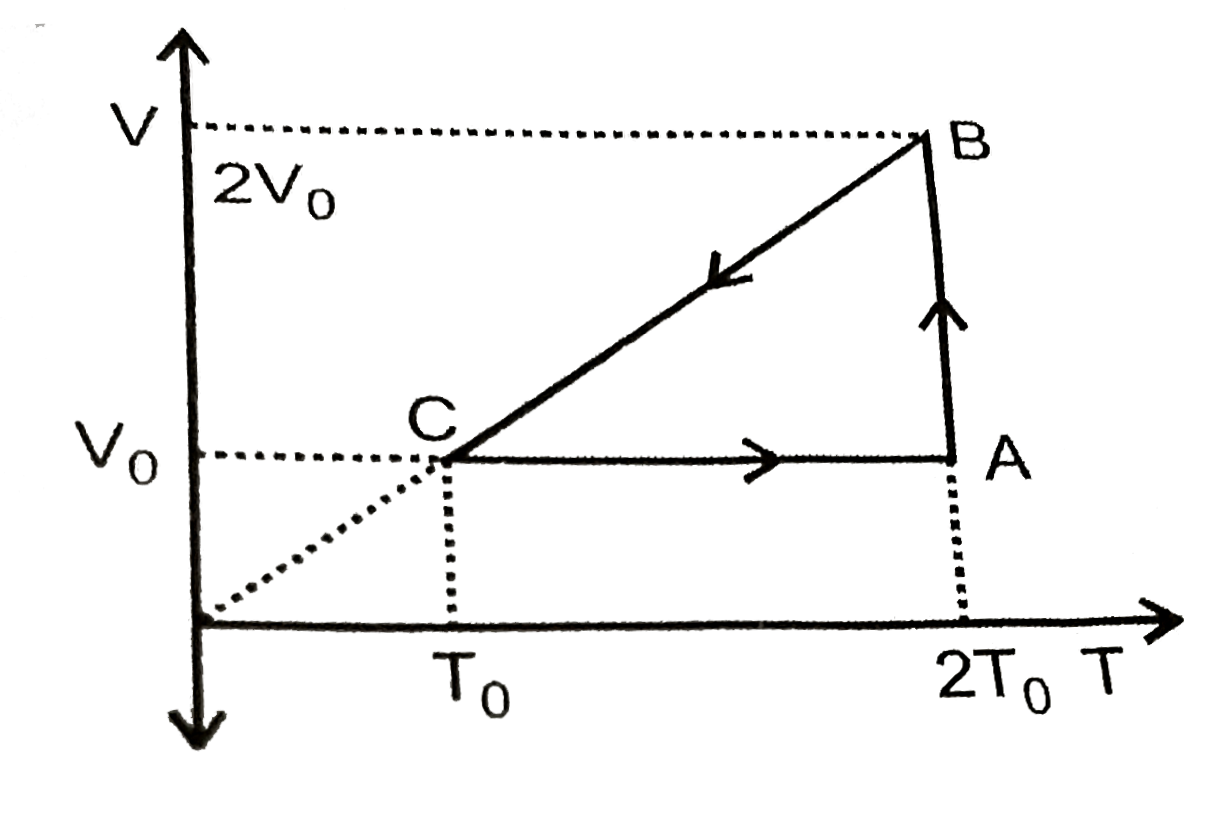The volume of one mode of an ideal gas with adiabatic exponent γ is varied according to the law V=a/T, where a is constant . Find the amount of heat obtained by the gas in this process, if the temperature is increased by ΔT.
The correct Answer is:A, B, D
To solve the problem, we need to find the amount of heat obtained by one mole of an ideal gas when its volume is varied according to the law V=aT, and the temperature is increased by ΔT.
1. Understand the Relationship Between Volume and Temperature:
The volume V of the gas is given by the equation:
V=aT
This implies that VT=a, which is a constant.
2. Apply the Ideal Gas Law:
The ideal gas law states:
PV=nRT
For one mole of gas (n=1), this simplifies to:
PV=RT
3. Relate Pressure and Volume:
From the ideal gas law, we can express pressure P in terms of volume V and temperature T:
P=RTV
4. Substituting for Volume:
Substitute V=aT into the pressure equation:
P=RTaT=RT2a
5. Identify the Type of Process:
The relationship PVx=constant can be compared to the polytropic process. Here, we have:
PV2=constant
This implies x=2.
6. Calculate the Molar Specific Heat Capacity:
The molar specific heat capacity C for a polytropic process is given by:
C=Cv+R1−x
where Cv=Rγ−1 (for an ideal gas). Substituting x=2:
C=Rγ−1+R1−2=Rγ−1−R
Simplifying this gives:
C=Rγ−1−R(γ−1)γ−1=R(2−γ)γ−1
7. Calculate the Heat Q:
The heat Q absorbed by the gas during the process when the temperature increases by ΔT is given by:
Q=nCΔT
For one mole (n=1):
Q=CΔT=(R(2−γ)γ−1)ΔT
8. Final Expression for Heat:
Thus, the amount of heat obtained by the gas in this process is:
Q=R(2−γ)γ−1ΔT
Summary:
The amount of heat obtained by the gas when the temperature is increased by ΔT is:
Q=R(2−γ)γ−1ΔT
The volume V of the gas is given by the equation:
V=aT
This implies that VT=a, which is a constant.
The ideal gas law states:
PV=nRT
For one mole of gas (n=1), this simplifies to:
PV=RT
From the ideal gas law, we can express pressure P in terms of volume V and temperature T:
P=RTV
Substitute V=aT into the pressure equation:
P=RTaT=RT2a
The relationship PVx=constant can be compared to the polytropic process. Here, we have:
PV2=constant
This implies x=2.
The molar specific heat capacity C for a polytropic process is given by:
C=Cv+R1−x
where Cv=Rγ−1 (for an ideal gas). Substituting x=2:
C=Rγ−1+R1−2=Rγ−1−R
Simplifying this gives:
C=Rγ−1−R(γ−1)γ−1=R(2−γ)γ−1
The heat Q absorbed by the gas during the process when the temperature increases by ΔT is given by:
Q=nCΔT
For one mole (n=1):
Q=CΔT=(R(2−γ)γ−1)ΔT
Thus, the amount of heat obtained by the gas in this process is:
Q=R(2−γ)γ−1ΔT
The amount of heat obtained by the gas when the temperature is increased by ΔT is:
Q=R(2−γ)γ−1ΔT
Topper's Solved these Questions
- LAWS OF THERMODYNAMICSBOOK - DC PANDEY ENGLISHCHAPTER - LAWS OF THERMODYNAMICSEXERCISE - Level 2 Passage II
3 Videos
- LAWS OF MOTIONBOOK - DC PANDEY ENGLISHCHAPTER - LAWS OF MOTIONEXERCISE - Medical entrances gallery
39 Videos
- MAGNETIC EFFECT OF CURRENT AND MAGNETISMBOOK - DC PANDEY ENGLISHCHAPTER - MAGNETIC EFFECT OF CURRENT AND MAGNETISMEXERCISE - Integer type Questions
10 Videos
Similar Questions
The volume of one mole of ideal gas with adiabatic exponent is varied according to law V=1T. Find amount of heat obtained by gas in this process if gas temperature is increased by 100 K.
View SolutionAn ideal gas has adiabatic exponent γ. It expands according to the law P=αV, where is α constant. For this process, the Bulk modulus of the gas is
View SolutionAn ideal gas of adiabatic exponent γ, expands according to law PV= β (where β is the positive constant). For this process the compressibility of the gas is
View SolutionThe efficiency of an ideal gas with adiabatic exponent 'γ' for the shown cyclic process would be

View SolutionThe efficiency of an ideal gas with adiabatic exponent 'γ' for the shown cyclic process would be

View SolutionAn ideal gas with adiabatic exponent γ is heated at constant pressure. It absorbs Q amount of heat. Fraction of heat absorbed in increasing the temperature is
View SolutionIn a process, temperature and volume of one mole of an ideal monoatomic gas are varied according to the relation VT= K, where K is a constant. In this process the temperataure of the gas is increased by ΔT. The amount of heat absorbed by gas is (R is gas constant).
View SolutionIn a process, temperature and volume of one mole of an ideal monoatomic gas are varied according to the relation VT= K, where K is a constant. In this process the temperataure of the gas is increased by ΔT. The amount of heat absorbed by gas is (R is gas constant).
View SolutionFind the molar heat capacity of an ideal gas with adiabatic exponent γ for the polytorpic process PVn= Constant.
View SolutionAn ideal gas with adiabatic exponent γ is heated isochorically. If it absorbs Q amount heat then, fraction of heat absorbed in increasing the internal energy is
View Solution
